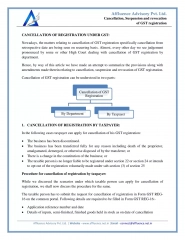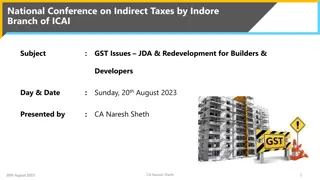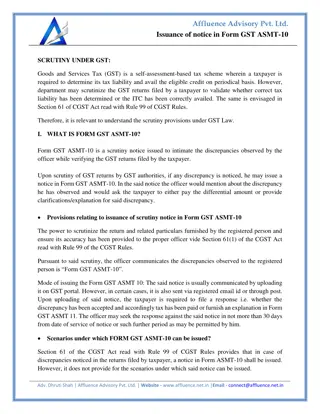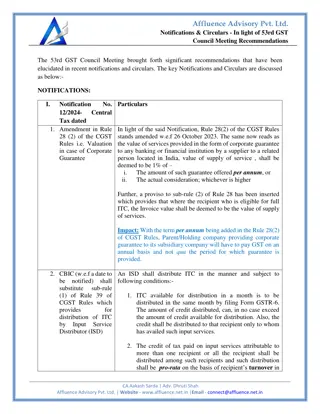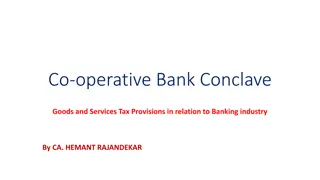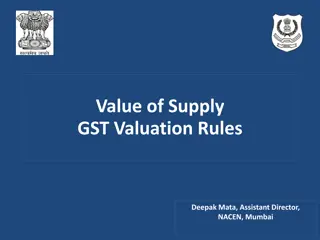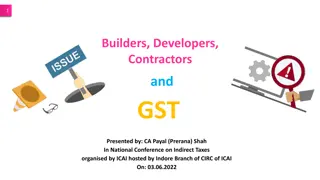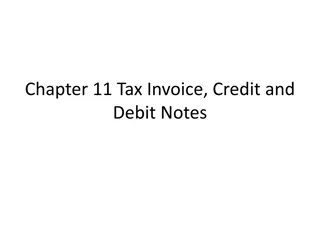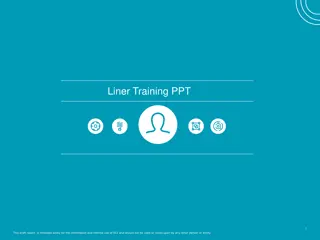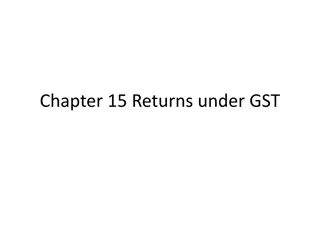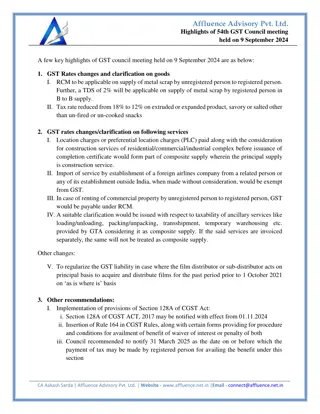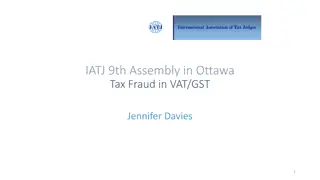Understanding JDA, GST Implications, and Supply of Goods and Services
Exploring the meaning of goods and services under GST, implications on developers and owners, and activities treated as supply. Also, delving into the nature and scope of Joint Development Agreements (JDAs) between landowners and developers. Highlighting the legal aspects and common practices involved in JDAs.
Download Presentation

Please find below an Image/Link to download the presentation.
The content on the website is provided AS IS for your information and personal use only. It may not be sold, licensed, or shared on other websites without obtaining consent from the author. Download presentation by click this link. If you encounter any issues during the download, it is possible that the publisher has removed the file from their server.
E N D
Presentation Transcript
JDA GST Issues and Implications on Developers and Owners V Raghuraman, Advocate
GST Basics Meaning of Goods and Services Sec 2(52): goods means every kind of movable property other than money and securities but includes actionable claim, growing crops, grass and things attached to or forming part of the land which are agreed to be severed before supply or under a contract of supply. Sec 2(102): services means anything other than goods, money and securities but includes activities relating to the use of money or its conversion by cash or by any other mode, from one form, currency or denomination, to another form, currency or denomination for which a separate consideration is charged.
GST Basics Supply What is Supply: Supply includes all forms of supply of goods or services. It includes sale, transfer, barter, exchange, license, rental, lease or disposal. Supply must be made for a Consideration. Supply must be in the course or furtherance of business. What is not Supply: Sale of land Sale of building, subject to Entry 5(b) of the II Schedule.
Activities to be Treated as Supply of Goods or Supply of Services- SCH. II Any lease, tenancy, easement, licence to occupy land is a supply of services. Any lease or letting out of the building including a commercial, industrial or residential complex for business or commerce, either wholly or partly, is a supply of services. Renting of immovable property is supply of service. Construction of a complex, building, civil structure or a part thereof, including a complex or building intended for sale to a buyer, wholly or partly, except where the entire consideration has been received after issuance of completion certificate, where required, by the competent authority or after its first occupation, whichever is earlier, is supply of services. Works contract is composite supply of service.
JDA Meaning / Nature / scope
Meaning Not defined in any statute. Common parlance - A Joint Development Agreement ( JDA ) is an agreement between a land owner and a real estate developer to construct new projects. The land is provided by the land owner and developer provides the capital, construction, marketing and legal services. Development right over the land is given to the developer which is to be developed by Developer using his own funds and resources. In addition to the development right , Power of attorney ( POA ) is also executed by the land owner in favour of the developer so that: Developer may obtain all necessary approvals. Developer is empowered to sell, lease or mortgage (a share of) the developed property i.e., undivided share of land and certain percentage of built up area in the building constructed by Developer. Such a POA would be coupled with interest and would be irrevocable in terms of Section 202 of the Indian Contract Act, 1872.
Meaning Bhaskar Aditya Vs Minati Majumdar AIR 2003 Cal 178: When the owner enters into an agreement for development with a developer, the development undertaken by the developer is definitely that of the owner through the developer, who is also an agent as well. By reason of such development agreement as agent of the owner, the developer acquires an interest in the property being subject-matter of the development and agency, by reason of section 202 of the Indian Contract Act, 1872 (Contract Act). An agency, in which the agent acquires interest in the property being the subject-matter of the agency, cannot be terminated to the prejudice of such interest of the agent in the absence of an expressed (sic, express) contract.
Meaning Ashok Kumar Jaiswal vs Ashim Kumar Kar AIR 2014 Cal 92 An owner without any funds or the independent resources to construct a new building on such owner's land may engage another for such purpose with the consideration for the construction being paid by allocation of a part of the constructed area. In the context in which certain agreements pertaining to the construction of new buildings contemplate the construction to be undertaken or orchestrated by a person other than the owner of the land, whether upon the demolition of the existing structure or otherwise, with such person other than the owner having a share in the constructed area, such agreements have now come to be regarded as development agreements. Whether or not such agreements are in the nature of collaboration or joint venture, they are loosely referred to as development agreements. Such agreements are not merely for the construction of any building or for the mere execution of any other work on the land. The developer is not merely a contractor engaged to undertake the construction; the developer is, under the agreement with the owner, promised a part of the constructed premises as owner thereof together with the proportionate area of the land.
Meaning Ashok Kumar Jaiswal vs Ashim Kumar Kar AIR 2014 Cal 92 In the context in which certain agreements are referred to as development agreements and the non-owner party to such an agreement is regarded as the developer qua the nature of the work envisaged under the agreement, the developer always has a share in the building or the area proposed to be constructed - which implies a proportionate share of the piece of earth - and such agreement envisages the developer to have a share of, and interest in, the final product which is the outcome of the agreement. A development agreement entails the transfer of immovable property in the sense that the developer or an assignee of the developer, at the instance of the developer, would be entitled not only to a part of the constructed area but the proportionate share of the land on which the construction is made. The position of a developer in the work undertaken pursuant to a development agreement has to be regarded as that of the conductor of an orchestra in the sense that he guides and controls the project and the owner's concern is limited to the timeliness and the quality of the project. The agency created by a power of attorney executed by the owner in favour of the developer may be seen to recognise an interest of the developer in the property which forms the subject-matter of the agency.
Meaning Faqir Chand Gulati Vs Uppal Agencies (P) Ltd (2008) 10 SCC 345: The landholder who gets some apartments may retain the same or may dispose of his share of apartments with corresponding undivided shares to others. The usual feature of these agreements is that the landholder will have no say or control in the construction. Nor will he have any say as to whom and at what cost the builder's share of apartments are to be dealt with or disposed of. His only right is to demand delivery of his share of constructed area in accordance with the specifications. New Horizons Ltd Vs Union of India [(1995) 1 SCC 478]: Joint venture connotes a legal entity in the nature of a partnership engaged in the joint undertaking of a particular transaction for mutual profit or an association of persons or companies jointly undertaking some commercial enterprise wherein all contribute assets and share risks. It requires a community of interest in the performance of the subject-matter, a right to direct and govern the policy in connection therewith, and duty, which may be altered by agreement, to share both in profit and losses. Joint ventures are, in general, governed by the same rules as partnerships. A joint venture is to be distinguished from a relationship of independent contractor, the latter being one who, exercising an independent employment, contracts to do work according to his own methods and without being subject to the control of his employer except as to the result of the work, while a joint venture is a special combination of two or more persons where, in some specific venture, a profit is jointly sought without any actual partnership or corporate designation
Meaning Faqir Chand Gulati Vs Uppal Agencies (P) Ltd (2008) 10 SCC 345: The landholder who gets some apartments may retain the same or may dispose of his share of apartments with corresponding undivided shares to others. The usual feature of these agreements is that the landholder will have no say or control in the construction. Nor will he have any say as to whom and at what cost the builder's share of apartments are to be dealt with or disposed of. His only right is to demand delivery of his share of constructed area in accordance with the specifications. New Horizons Ltd Vs Union of India [(1995) 1 SCC 478]: Joint venture connotes a legal entity in the nature of a partnership engaged in the joint undertaking of a particular transaction for mutual profit or an association of persons or companies jointly undertaking some commercial enterprise wherein all contribute assets and share risks. It requires a community of interest in the performance of the subject-matter, a right to direct and govern the policy in connection therewith, and duty, which may be altered by agreement, to share both in profit and losses. Joint ventures are, in general, governed by the same rules as partnerships. A joint venture is to be distinguished from a relationship of independent contractor, the latter being one who, exercising an independent employment, contracts to do work according to his own methods and without being subject to the control of his employer except as to the result of the work, while a joint venture is a special combination of two or more persons where, in some specific venture, a profit is jointly sought without any actual partnership or corporate designation
Meaning Faqir Chand Gulati Vs Uppal Agencies (P) Ltd (2008) 10 SCC 345: Joint venture , a term used interchangeably and synonymous with joint adventure , or coventure, has been defined as a special combination of two or more persons wherein some specific venture for profit is jointly sought without any actual partnership or corporate designation, or as an association of two or more persons to carry out a single business enterprise for profit. Among the acts or conduct which are indicative of a joint venture, no single one of which is controlling in determining whether a joint venture exists, are: (1) joint ownership and control of property; (2) sharing of expenses, profits and losses, and having and exercising some voice in determining division of net earnings; (3) community of control over, and active participation in, management and direction of business enterprise; (4) intention of parties, express or implied; and (5) fixing of salaries by joint agreement. An agreement between the owner of a land and a builder, for construction of apartments and sale of those apartments so as to share the profits in a particular ratio may be a joint venture, if the agreement discloses an intent that both parties shall exercise joint control over the construction/development and be accountable to each other for their respective acts with reference to the project.
Meaning Faqir Chand Gulati Vs Uppal Agencies (P) Ltd (2008) 10 SCC 345: The basic underlying purpose of the agreement is the construction of a house or an apartment (ground floor) in accordance with the specifications, by the builder for the owner, the consideration for such construction being the transfer of undivided share in land to the builder and grant of permission to the builder to construct two floors. Such agreement whether called as a collaboration agreement or a joint venture agreement , is not, however, a joint venture . There is a contract for construction of an apartment or house for the appellant, in accordance with the specifications and in terms of the contract. There is a consideration for such construction, flowing from the landowner to the builder (in the form of sale of an undivided share in the land and permission to construct and own the upper floors). To that extent, the landowner is a consumer, the builder is a service provider. In a true joint venture agreement between the landowner and another (whether a recognised builder or fund provider), the landowner is a true partner or co-adventurer in the venture where the landowner has a say or control in the construction and participates in the business and management of the joint venture, and has a share in the profit/loss of the venture. In such a case, the landowner is not a consumer nor is the other co-adventurer in the joint venture, a service provider. The landowner himself is responsible for the construction as a co-adventurer in the venture. But such true joint ventures are comparatively rare.
Meaning Faqir Chand Gulati Vs Uppal Agencies (P) Ltd (2008) 10 SCC 345: What is more prevalent are agreements of the nature found in this case, which are a hybrid agreement for construction for consideration and sale and are pseudo joint ventures. Normally a professional builder who develops properties of others is not interested in sharing the control and management of the business or the control over the construction with the landowners. Except assuring the landowner a certain constructed area and/or certain cash consideration, the builder ensures absolute control in himself, only assuring the quality of construction and compliance with the requirements of local and municipal laws, and undertaking to deliver the owners' constructed area of the building with all certificates, clearances and approvals to the landowner.
Meaning Income Tax Act Perspective In the hands of Promoter/Developer: Under JDA transactions, the income accrues or arising to the developer in the form of consideration received on the sale of constructed property (only to the extent of developer s share in the property) would be taxable as his business income . In the hands of Landowner: The income that accrues or arises to the landowner is on the transfer of title of land or immovable property . The income may be either in the form of consideration in money (i.e. revenue sharing model) or in the form of specified area in the constructed property. Such incomes would be chargeable under the heading capital gain . The expression transfer is defined in section 2(47). Amongst other things, it includes section 2(47)(v) which says any transaction involving the allowing of the possession of any immovable property to be taken or retained in part performance of a contract of the nature referred to in section 53A of the Transfer of Property Act, 1882
Meaning Income Tax Act Perspective In order to settle the issue of taxability of landowner s share on the date of Transfer, section 45(5A) was introduced by the Finance Act, 2017 w.e.f 01.04.2018. It provides for the taxation of capital gain arising to an Individual or HUF from transfer of land or building or both in respect of specified agreements . The chargeable event is the year in which the certificate of completion for the whole or part of the project is issued by the competent agreement. Explanation to section 45(5A) defines a specified agreement . It refers to a registered agreement in which a person owning land or building or both, agrees to allow another person to develop a real estate project on such land or building or both, in consideration of a share, being land or building or both in such project, whether with or without payment of part of the consideration in cash;
Meaning Income Tax Act Perspective Jasbir Singh Sarkaria, In re [2007] 294 ITR 196 (AAR): On adopting the principle of purposive construction, it must be held that possession contemplated by clause (v) need not necessarily be sole and exclusive possession. So long as the transferee is, by virtue of the possession given, enabled to exercise general control over the property and to make use of it for the intended purpose, the mere fact that the owner has also the right to enter the property to oversee the development work or to ensure performance of the terms of agreement does not introduce any incompatibility. What is spoken to in clause (v) of section 2 (47) is the 'transaction' which involves allowing the possession to be taken. By means of such transaction, a transferee like a developer is allowed to undertake development work on the land by assuming general control over the property in part performance of the contract. The date of that transaction determines the date of transfer. The actual date of taking physical possession or the instances of possessory acts exercised is not very relevant. The ascertainment of such date, if called for, leads to complicated inquiries, which may frustrate the objective of the legislative provision. It is enough if the transferee has, by virtue of that transaction, a right to enter upon and exercise acts of possession effectively pursuant to the covenants in the contract. That tantamount to legal possession.
Meaning Income Tax Act Perspective C.S. Atwal vs CIT [2015] 59 taxmann.com 359 (P&H): In the context of section 2(47)(v) of the Income Tax Act, 2017, the concept of possession to be defined is an enormous task to be precisely elaborated. "Possession" is a word of open texture. It is an abstract notion. It implies a right to enjoy which is attached to the right to property. It is not purely a legal concept but is a matter of fact. The issue of ownership depends on rule of law whereas possession is a question dependent upon fact without reference to law. To put it differently, ownership is strictly a legal concept and possession is both a legal and a non-legal or pre-legal concept. The test for determining whether any person is in possession of anything is to see whether it is under his general control. He should be actually holding, using and enjoying it, without interference on the part of others.
JDA Meaning Income Tax Act Perspective Chaturbhuj Dwarkadas Kapadia Vs. CIT 260 ITR 491 (Bom), the Bombay High Court held that in the case of a development agreement, if the contract, read as a whole, indicates passing of or transferring of complete control over the property in favour of the developer, then the date of the contract would be relevant to decide the year of chargeability of capital gains and the substantial performance of the contract would be irrelevant.
Types Area sharing model: Agreed portion of constructed / developed property is handed over to the land owner Generally by entering into an area sharing agreement or a conveyance deed. Revenue sharing model: Entire developed property is sold through developer; Agreed portion of the revenue is shared between developer and land owner
Developmental right- Legal references Details STATUTE Section 14B of Karnataka Town and Country Planning Act, 1961: It is the right to carry out development or to develop land or building or both. Section 2(9A) of Maharashtra Town and Country Planning Act, 1966 It is the right to carry out development or to develop the land or building or both and shall include the transferable development right in the form of right to utilize the Floor Space Index of land utilizable either on the remainder of the land partially reserved for a public purpose or elsewhere, as the final Development Control Regulations.
IMMOVABLE PROPERTY- defined STATUTE Details Section 2(26) of General Clauses Act, 1897: attached to the earth, or permanently fastened to anything attached to the earth Shall include land, benefits to arise out of land, and things Section 2(z) of Real Estate (Regulation and Development) Act, 2016: Includes land, buildings, rights of ways, lights or any other benefit arising out of land and things attached to the earth or permanently fastened to anything which is attached to the earth, but not standing timber, standing crops or grass. Section 3 of Transfer of Property Act, 1882: Immovable property" does not include standing timber, growing crops or grass. Section 2(6) of Registration Act, 1908: Immovable property allowances, rights to ways, lights, ferries, fisheries or any other benefit to arise out of land, and things attached to the earth or permanently fastened to anything which is attached to the earth, but not standing timber, growing crops nor grass. includes land, buildings, hereditary
BENEFITS ARISING OUT OF LAND-Judicial view Safiya Bee Vs Mohammad Vajahath Hussain (2011) 2 SCC 94 Land includes rights in or over land and all Benefits to arise out of land Anand Behera Vs State of Orissa (1955) 2 SCR 919 Right to enter in that estate, which he does not own and take away fish therefrom is Profit a Prendre , which is in turn regarded as a benefit to arise out of the land and hence it is immovable property. State of Orissa Vs Titaghur Paper Mills Co Ltd AIR 1985 SC 1293 The right to cut and remove bamboos which would grow from the soil coupled with ancillary rights and was thus a grant of a profit a prendre which is a benefit arising out of land. Sikandar Vs Bahadur ILR (1905) All 462 Right to collect market dues upon a given piece of land is a benefit to arise out of land within the purview of Section 3 of the Indian Registration Act) held that right to collect market dues upon a given piece of land is a benefit arising out of land within the meaning of Section 3 of the Indian Registration Act, 1908.
WHETHER DEVELOPMENT RIGHTS ARE BENEFITS ARISING OUT OF LAND ? Chheda Housing Development Vs Bibijan Shaikh Farid 2007 (3) MhLJ 402 Transferable development rights ( TDR ) would be immovable property This view was further endorsed in the case of Jitendra Bhimshi Shah Vs Muljinarpar Dedhia HUF 2009 (4) MhLJ 533. Sadoday Builders Private Ltd Vs Joint Charity Commissioner 2011 (6) BomCR 42 The question was whether the permission of the Joint Charity Commissioner was required in terms of Section 36(1)(c) of the Bombay Public Trusts Act, 1950 for sale of TDR in slum area. Relying on Chheda Housing Development (supra), it was inter alia held that TDR is a benefit arising out of land and must be considered as an immovable property Ashish Mukerji Vs UOI [1996] 222 ITR 168 (Patna): JDA would involve transfer of property in terms of section 269UA(d)(ii) of Income Tax Act,
WHETHER DEVELOPMENT RIGHTS ARE BENEFITS ARISING OUT OF LAND ? Sumer Corporation Vs State of Maharashtra (2017) 102 VST 251 (Bom) Construction of flats free of cost against TDR from the Slum Rehabilitation Authority (SRA) would be a works contract liable to VAT >Decision in the case of Chheda Housing Development not considered > Pending before the Supreme Court in Civil Appeal 396-397 of 2018. Chaturbhuj Dwarkadas Kapadia 260 ITR 491 - Transfer of property by way of development rights is capital asset u/s 2(14) of the ITA. - JDA read as a whole indicates passing of or transfer of complete control over the property in favour of the developer, i.e, if it confers privileges of ownership without transfer of title, then, it would constitute a transfer within the meaning of Section 2(47)(v) of the Income tax Act. This case was further relied upon in CIT Vs Dinesh Ranka 2015-TIOL-1585-HC-KAR-IT. Girnar Traders Vs State of Maharashtra (2011) 3 SCC 1 Land development right is a right to carry out development or to develop the land or building or both
Sale of developed site or property service as per consumer protection law NARNE CONSTRUCTION P. LTD. Vs. Union of India, 2013 (29) S.T.R. 3 (S.C) Faquir Chand Gulati Vs Uppal Agencies 2008 (12) S.T.R. 401 (S.C.)
JDA Whether Land Owner Transfers Development Rights to the Developer : WHAT IS TRANSFER ? Section 5 of Transfer of Property Act, 1882 defines transfer of property to mean an act by which a living person conveys property, in present or in future, to one or more other living persons, or to himself, or it himself and one or more other living persons. The following can be termed as transfer as they are governed by TP Act, 1882: Sale Mortgage Lease Exchange Gift Transfer of actionable claim
Can NOT be termed as Transfer? Section 6 of Transfer of property Act, 1882 says that property of any kind may be transferred, except as otherwise provided by TP Act, 1882 or by any other law for the time being in force. The following inter alia cannot be termed as transfer : A mere right of re-entry for breach of a condition subsequent cannot be transferred to any one except the owner of the property affected thereby. An easement (eg: a license or a right of way) cannot be transferred apart from the dominant heritage. An interest in property restricted in its enjoyment to the owner personally cannot be transferred by him. A mere possibility (of say, an heir-apparent succeeding to an estate).
WHETHER JDA IS A LEASE TRANSACTION? As per Section 105 of the Transfer of Property Act, 1882 ( TP Act ), lease of immovable property is inter alia defined as transfer of a right to enjoy property for a limited period or in perpetuity for a consideration, whether periodic or otherwise. WHETHER JDA IS AN EXCHANGE TRANSACTION? The essential ingredients of Section 118 TP Act are as follows: There must be a mutual transfer between two persons; and One person must transfer ownership of one thing; and Another person must transfer ownership of another thing; and Neither thing transferred must be money; or Both things transferred must be money. WHETHER JDA IS AN BARTER TRANSACTION? In case of Bren Corporation Vs JCCT (Appeals) 2018-TIOL-01-TRIBUNAL-KAR-VAT, it was held that JDA entered into between land owner and developer is in the nature of a barter and the transaction neither falls under the ambit of sale u/s 2(29) nor works contract u/s 2(37) of the KVAT Act, 2003 as the element of valuable consideration is absent. Consequently, VAT could not be levied on the developer in a JDA.
WHETHER JDA IS A SALE TRANSACTION? Section 54 of the TP Act inter alia defines sale as transfer of ownership in exchange for a price paid or promised or part-paid and part-promised. Why JDA may not be considered as a sale transaction: Mohammad Noor Vs Mohammad Ibrahim (1994) 5 SCC 562: A person can be considered to be owner if he has absolute dominion over it in all respects. Ownership is a sum total of various subordinate rights (such as heritability, transferability, etc). In a JDA transaction all subordinate rights are not transferred to developer. As per the Karnataka Stamp Act, 1957, a JDA would bear stamp duty in terms of Article 5(f) of the Schedule of that Act. Whereas, for sale/conveyance stamp duty would be paid in terms of Article 20 thereof at a different rate from that of a JDA transaction. In Suraj Lamp & Industries Pvt Ltd Vs State of Haryana (2012) 1 SCC 656 it was held that a transfer of immovable property by way of sale can only be by a deed of conveyance (sale deed). In the absence of a deed of conveyance (duly stamped and registered as required by law), no right, title or interest in an immovable property can be transferred. Therefore, the land owners may have to execute a separate exchange deed or conveyance deed in favour of the Developer to convey the developer s share or the developer may himself execute a sale deed in his own favour using powers under the PoA so as to confer proper title in favour of the developer.
WHETHER JDA IS A LICENSE TRANSACTION? Section 52 of Easement Act, 1882 defines license . Where one person grants to another, or to a definite number of other persons, a right to do, or continue to do, in or upon the immovable property of the grantor, something which would, in the absence of such right, be unlawful, and such right does not amount to an easement or an interest in the property, the right is called a license. In a license , there is no creation of interest in property and merely a permission is granted to undertake an activity. The legal possession , therefore, continues to be with the owner of the property, but the licensee-developer is permitted to make use of the premises for a particular purpose. But for the permission, the occupation of the developer would be unlawful.
WHETHER JDA IS A LICENSE TRANSACTION? A typical/standard JDA usually contains a clause which states that the land owner shall not revoke the permission granted to the developer (to develop property) under the JDA till completion of the project provided that nothing in the JDA shall be construed as delivery of possession in part performance of any Agreement of Sale under Section 53A of the TP Act. The intention of such a clause in the JDA is that, after license is given to the developer for effecting construction (as per the JDA) and at a future date, if the land owner wants to evict the developer from the land, the developer should not be allowed to take the defense of having part-performed his side of the contract in terms of Section 53A of that Act. So, by virtue of this clause, a strong argument can also be put forward that the developer is not in possession of the immovable property in terms of the said contract and the JDA merely gives him a license to develop the immovable property.
WHETHER LAND OWNER TRANSFERS DEVELOPMENT RIGHTS TO THE DEVELOPER? Can be argued that development rights are nothing but merely a right to occupy and carry out work on the land and are hence a mere license and there is no transfer. But since it is irrevocable, it means some interest is passing to the developer. Therefore, it cannot be a mere license. Neither is it a sale. Could be an exchange or barter. It may later crystalize as a sale when land owner executes a sale deed in favour of the developer for the developer s share. Grey area in law. Need for authoritative ruling. If development right is not transferred , no service is said to be provided by land owner to the developer and no GST is attracted.
SERVICE TAX REGIME Circular 151/2/2012-ST dated 10.02.2012 @ Para 2.1 development rights by land owner to developer was treated as sale of land and, thus, is not a taxable service. DLF Commercial Projects Corporations Vs CST, Gurugram 2019-TIOL-1514-CESTAT- CHD: Once the landowning companies transfers the land development rights to developer for a consideration, it is obligated to transfer the undivided interest in the land in favour of developer's buyers for which no separate consideration is paid for it. Thus, it is the ownership of the land, which stands transferred effectively by the landowning company in return of consideration payable by the developers. The moment it is either land or benefits arise out of land , it goes outside the purview of 'Service . As the High Court observed in the case of Sadoday Builders (P) Ltd v. Jt Charity Commissioner MANU/MH/07912011that transferable development right is immovable property, therefore, the transfer of development rights in the case in hand is termed as immovable property in terms of section 3 (26) of General Clauses Act, 1897 and no service tax is payable.
GST REGIME ARGUMENTS AGAINST TAXABILITY Article 246(2) of the Constitution grants exclusive powers to make laws in respect of matters enumerated under List II of the Seventh Schedule of the Constitution: Entry 18: Land, that is to say, rights in or over land, land tenures including the relation of landlord and tenant, and the collection of rents; transfer and alienation of agricultural land; land improvement and agricultural loans; colonization. Entry 49: Tax on land and buildings. Article 246A of the Constitution, inserted by virtue of the 101stAmendment empowers the center and states to impose tax on goods and services concurrently, notwithstanding Article 246. State of West Bengal Vs Kesoram Industries Ltd (2004) 10 SCC 201: Land includes all strata above or below. In other words, the word 'land' includes not only the surface of the earth but everything under or over it, and has in its legal significance an indefinite extant upward and downward.
GST REGIME Land Owner Land owner is ultimately transferring his ownership in land for a consideration which is either in Cash or in the nature of certain share in developed property. There is no supply of goods or service Developer Developer has the right to sell the property constructed on the land. Hence, the same is squarely covered as transfer of property (viz. land) and hence the same will fall in Schedule III. Taxes on lands and buildings form part of State List (Entry 49 of List II). Hence once it is said that development right is nothing but immovable property(land), GST cannot be levied on its transfer.
GST REGIME ARGUMENTS AGAINST TAXABILITY Schedule II is part of section 7 which deals with scope of supply. The levy under GST is on supply. Therefore, section 7 which deals with scope of supply and which influences the charging section has to be construed strictly. Nothing can be read into it which would enlarge the scope of supply and in turn enlarge of the scope of charge. The Supreme Court in Gopal and Sons (HUF) Vs CIT [2017] 391 ITR 1 (SC) reiterated this principle. The principle of strict interpretation will have to be applied even on this count.
GST REGIME ARGUMENTS AGAINST TAXABILITY Section 7(1A) read with Schedule II is a provision that helps to classify certain transactions if they are in the nature of supply as per section 7. In Para 2(a) of Schedule II, a fiction has been created stating that license to occupy land is supply of service. In the Supreme Court in CIT Vs Mother India Refrigeration Industries (P) Ltd [1985] 155 ITR 711 (SC) following the decision of the Hon ble Supreme Court in Bengal Immunity Co Ltd Vs State of Bihar [1955] 2 SCR 603 held that while construing the scope of legal fictions are created only for some definite purpose and these must be limited to that purpose and should not be extended beyond that legitimate field. Therefore, the question of interpreting the provision in a manner which effectuates the purpose for which the fiction is sought to be created doesn t arise if the plain reading of the provision doesn t so warrant.
GST REGIME ARGUMENTS AGAINST TAXABILITY If a JDA was to be construed as giving a license to the developer to develop land, it would not fit into Para 2 of Schedule II of the Act. Para 2(a) of Schedule II of the Act inter alia specifies that license to occupy land is supply of services . The word occupy is defined in Black s Law Dictionary as to take possession of . Therefore, the phrase licence to occupy land would cover only those cases where the licensee has a right to occupy a defined piece of property as their own for an agreed period. It does not entail license to construct on land.
GST REGIME ARGUMENTS AGAINST TAXABILITY Further, Para 2(b) of Schedule II specifically deals with lease or letting out of building. It doesn t include licensing of building. If the intention were to include even building in paragraph 2(a), then paragraph 2(b) becomes otiose. Moreover, if the intention superstructure, it would have used the expression land or building or both. Moreover, the intention is not to include licensing of building. Hence, the expression license is conspicuously absent in para 2(b) of Schedule II. were to cover land with
GST REGIME ARGUMENTS AGAINST TAXABILITY When Schedule II has carved out license to occupy land as supply of services so as to not to give any discretion either to the assessee or to the revenue to contend its nature, it defies logic to state that the rest (other kinds of licenses) which are connected to immovable property would continue to fall under section 7(1)(a). The legislature has mindfully used the expression license to occupy land . It is evident from non-usage of term license in Para 2(b) of Schedule II related to building. Therefore, it is trite to contend that the rest of the categories of licenses would not be liable for GST. It is irreconcilable to one s mind that the legislature wanted to deem license to occupy land as supply of service to avoid litigation and did not want to deem rest of the licenses in relation to immovable property as supply of service.
GST REGIME ARGUMENTS AGAINST TAXABILITY The rights given to a builder are clearly called developmental rights. Lease or license is an inferior right or a lesser right as compared to the developmental right which is the superior right. The inferior rights would merge into the superior right and therefore, developmental rights would be the defining moment in the transaction. In this regard, we can refer to the judgment of the constitution Bench of the Supreme Court in Sunrise Associates (2006) 5 SCC 603. Therefore, it can be argued that development right granted by the land owner under JDA is a superior right and being immovable property, the grant of developmental rights by the land owner cannot be subjected to the levy of GST.
GST REGIME ARGUMENTS IN FAVOR OF TAXABILITY The definition of supply is an inclusive one and purports to cover within its ambit even those activities which are not expressly mentioned but are implied to be part of the definition. Home Retail Solutions Pvt Ltd Vs UOI 2011 (24) STR 129 (Del). observed that what is being taxed is an activity, and the activity denotes the letting or leasing with a purpose, and the purpose is fundamentally for commercial or business purpose and its furtherance. Once there is a value addition and the element of service is involved, in conceptual essentiality, service tax gets attracted and the impost gets out of the purview of Entry 49 of List II of the Seventh Schedule of the Constitution. This case has been referred to larger bench of Supreme Court vide order reported in 2018 (13) GSTL 3 SC .
WHETHER LANDOWNER CONSIDERATION? One way of looking at the transaction is that for transfer of development rights, the consideration is the construction activity provided by the developer. In terms of Section 2(31)(b), the monetary value of the construction service provided by the developer in response to the transfer of development rights by the landowner to the developer can be said to be the consideration. Alternatively, the consideration for the transfer of developmental right would be to get a portion of the building constructed / land developed by the developer. Both being immovable properties (developmental rights as well as the building constructed or land developed), the same cannot brought to tax under GST. SUPPLY TO (OF THE DEVELOPMENT DEVELOPER) RIGHTS MADE BY FOR THE IS A
WHETHER SUPPLY (OF DEVELOPMENT RIGHTS BY THE LANDOWNER TO THE DEVELOPER) IS MADE IN THE COURSE OR FURTHERANCE OF BUSINESS ? Business is defined in Section 2(17) of the CGST Act in a wide manner. Circular F. No. 354/32/2019-TRU dated 07.05.2019, it has been clarified in the affirmative at Sl No. 39.
Taxability of Works Contract L&T Ltd Vs State of Karnataka 2014 (303) ELT 3 (SC) Even though the ultimate transaction between the parties may be sale of the flat, it cannot be said that the characteristics of works contract are not involved in that transaction because the term works contract is nothing but a contract in which one of the parties is obliged to undertake or to execute the work and such an activity of construction bears all the characteristics and elements of works contract. Works contract comes into picture only where there is an agreement to sell / construct and sell with a third party is entered into and from the date of such agreement. Conversely, the construction activity undertaken by the developer on the land of the owner under the joint development agreement would not be a works contract if, either the said flat is sold after completion of the apartment or the flat is retained by the developer or by the owner.
JDA Point of Taxation and valuation
Time of Supply Prior to 01.04.2019 Notification 4/2018-CT(R) dated 25.01.2018 It proceeds on a presupposition that supply exists as between developer and land owner and vice versa; that transfer of development rights is a supply . Does not apply to revenue sharing model. Service Service Consideration Time of Supply Service Recipient Supplied Provider Land Owner Developer Development Construction When developer transfers possession or the right in the constructed complex, building or civil structure, to the land owner by entering conveyance similar instrument example allotment letter. (Registered (Registered rights service of Person) Person) complex, building or civil structure into deed a Developer Land Owner construction Development or (Registered (Registered service of rights Person) Person) complex, (for building or civil structure



